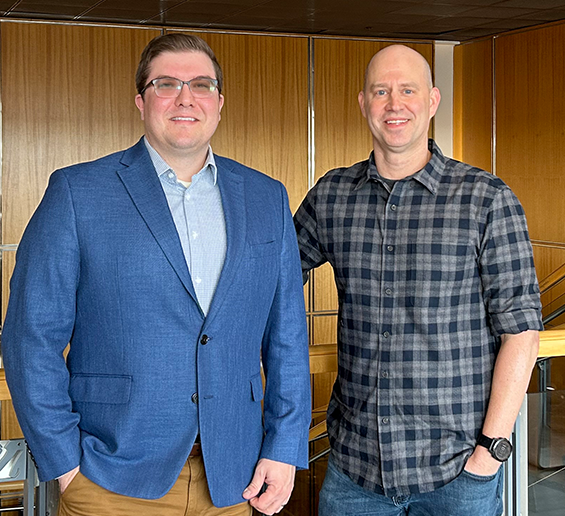 By Merin C. MacDonald | Date Published: March 20, 2024
By Merin C. MacDonald | Date Published: March 20, 2024
UMass Chan Scientists Receive DoD Funding to Study Pancreatic Cancer Cachexia
Pancreatic ductal adenocarcinoma (PDAC) is a leading cause of cancer death with many PDAC patients dying due to a phenomenon called “cancer cachexia”, a systemic metabolic wasting syndrome marked by profound adipose tissue and muscle loss. UMass Chan scientists Jason Pitarresi, PhD, assistant professor of medicine in the Division of Hematology/Oncology, and David Guertin, PhD, professor of molecular medicine have received funding from the Department of Defense for their project, “Determining the Molecular Etiology of and Strategies to Block Pancreatic Cancer Cachexia”, to study the mechanisms of PDAC-associated cachexia using novel mouse models and human organoid systems.
“More than 75% of PDAC patients develop severe cachexia and lose more than 15-25% of their body weight within six months of diagnosis,” said Dr. Pitarresi. “Further, nearly one-third of PDAC deaths can be attributed to complications due to cachexia, with chemotherapeutic interventions and clinical trials often being halted due to cachexia.”
Recent studies suggest adipose tissue wasting is an early and targetable event in cancer-associated cachexia forming the rationale for Dr. Pitarresi and Dr. Guertin’s collaboration. They have identified a lead molecule, PTHrP, that they believe is driving cachexia and are testing new anti-PTHrP therapies in animal models to determine if it can block and/or reverse cachexia. Biologically, their studies may elucidate how cachectic tumors reshape host physiology across multiple organs. Therapeutically, if successful, their work in animal models will lay the foundation for anti-PTHrP cachexia targeted therapy in the clinic to extend survival and/or the chemotherapeutic window.
The team’s diverse expertise allows for an innovative collaborative approach to this project. “Dr. Pitarresi is approaching this problem from his background in PDAC and cancer cell biology, and I am approaching it from a background in signaling, adipose tissue biology, and energy metabolism pathways, making this an ideal team merger created, in part, by the unique culture of the faculty here at UMass Chan,” said Dr. Guertin. “It also takes a unique team of experts to solve such a hard and complex problem of cancer cachexia.”
Drs. Pitarresi and Guertin are joined by an enthusiastic team of collaborators at UMass Chan including Julie Zhu and Karl Simin of Molecular, Cell and Cancer Biology, John Harris and Nuria Martinez Gutierrez of Dermatology, and Caroline Lewis Chidley of the Program in Molecular Medicine, as well as Nina Steel from the Henry Ford Pancreatic Cancer Center, and Cholsoon Jang from the University of California, Irvine.
